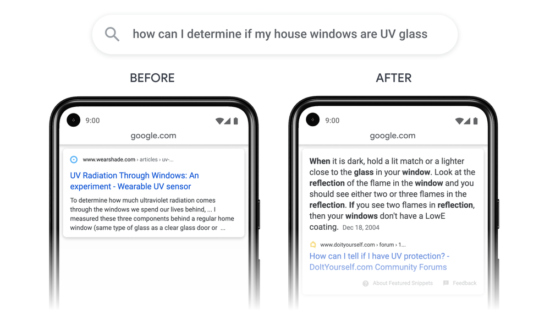Google’s announcement that its latest update will better index – and better rank – specific web page passages has caused quite the stir in the SEO community and among digital marketers. According to Google, the update, which will be rolled out globally by the end of 2020, will improve 7 percent of all search queries. But what is Passage Indexing and how will it improve rankings for holistic content? Find out below.
Google Passage Indexing to improve 7 percent of all search queries
In its mid-October livestream event Search On, Google unveiled forthcoming changes to the search engine, including exciting new developments for SEOs and digital marketers. Besides announcing that BERT now powers every single English-based query on Google Search, Google also revealed its new Passage Indexing feature.
Passage Indexing is essentially about improving results for long-tail search queries – often niche queries that are hard to find a precise answer to, even with Google Indexing. Google’s current method of indexing is based on whole page indexing, where web pages are assigned to a certain topic and corresponding subtopics that can be found on the page.
With the new AI-based Passage Indexing, Google can now also index specific passages more precisely, returning them in the results for specific long-tail search queries. According to Google, this technology will improve 7 percent of all search queries, which is quite a significant proportion if you consider the scale and impact of previous Google Updates. The new technology is expected to be rolled out globally by the end of 2020.
“Very specific searches can be the hardest to get right, since sometimes the single sentence that answers your question might be buried deep in a web page. We’ve recently made a breakthrough in ranking and are now able to not just index web pages, but individual passages from the pages. By better understanding the relevancy of specific passages, not just the overall page, we can find that needle-in-a-haystack information you’re looking for. This technology will improve 7 percent of search queries across all languages as we roll it out globally.”
Google statement on Passage Indexing
SEO community in a tailspin over Google announcement
Google’s announcement about Passage Indexing caused some confusion in the SEO community, particularly because of the use of the word “indexing”. Google has since clarified that they will still be indexing full pages but, with the help of AI, will now also consider the content of individual passages in web pages when ranking relevant long-tail search queries:
This change doesn’t mean we’re indexing individual passages independently of pages. We’re still indexing pages and considering info about entire pages for ranking. But now we can also consider passages from pages as an additional ranking factor….
— Google SearchLiaison (@searchliaison) October 20, 2020
Passage Indexing improves Google’s ability to return specific answers to long-tail queries. The results returned look similar to the answer boxes known as Featured Snippets, as shown below:

In the image on the left, the results of a long-tail search query are shown in the form of a standard snippet containing header, link and description for an entire web page. The image on the right, in contrast, shows the Passage Indexing results, where AI is used to identify a key passage on a web page and display this in an answer box that resembles a Featured Snippet.
John Mueller: Google can better understand untidy websites
Google Webmaster Trends Analyst John Mueller spoke about passage indexing in one of the last Google Hangout sessions. According to him, it is not a core update; instead, the core is the implementation of new techniques that help to better understand individual passages on websites and rank them for specific user requests.
John explained that it does not make sense to optimize your own websites for specific passages. In addition, there is no special Google index just for passages.
The advantage for Google is that now untidy websites can be understood just as well as clean pages with a clear focus, titles, headings, etc.
Below you can take a look at the question and John’s answer about Passage Indexing:
What does Passage Indexing mean for SEOs and digital marketers?
We can expect the proportion of Featured Snippets in Google search results to increase, meaning SEOs and digital marketers need to be checking those (long-tail) keywords that are relevant to them for changes in terms of what is included in Featured Snippets. According to the Searchmetrics SERP Features Monitor, the following share of Google search query results returned a Featured Snippet in October 2020:
| Country | Desktop | Mobile |
| Germany | 7,6 % | 5,7 % |
| UK | 8,4 % | 6,1 % |
| USA | 8,9 % | 6,1 % |
If we can expect to see a trend towards Google ranking web page passages as standard snippets rather than entire pages, the length of the content on a web page is essentially of no consequence. Google’s AI-based Passage Indexing means that website content is likely to become more holistic again. Long-form content, which covers all the relevant subtopics related to a given topic, now has better chances of getting traffic and conversions through good rankings for long-tail search queries, too.
For website operators, SEOs and digital marketers, this means they will have to ensure that content is holistic, covers all the subtopics and key user questions on the main topic, is well structured and easy to navigate, and that all the schema markups are implemented. With the new Passage Indexing feature, long-tail search queries can also achieve relevant rankings, ideally bringing about increased traffic and conversions.
What is debatable, however, is whether Featured Snippets for websites do in fact help increase CTR and traffic. In fact, this type of snippet very often answers the detailed question, too, meaning the user does not have to click any further. In recent years, this has led to more and more zero-click searches. In fact, half of all queries are now zero-click searches.
What does Passage Indexing mean for Google and for users?
This latest indexing update takes Google one step further away from its function as a search engine, turning it into something of an “response engine” that seeks to give users the answer to their question as quickly as possible. This is a win-win situation for both users and Google because the user is not first directed to a search results web page where they have to plough through multiple chapters and thousands of words to find the answer to their potentially very detailed and specific question. Instead, the user is given the answer directly in the form of a Featured Snippet, which is a clear plus for the user. The benefit for Google is that the user stays on its platform.
How can I identify all the different user intentions related to my topic?
There are a number of things that SEOs and content marketers can do to make web pages truly holistic and ensure they rank for subtopics and key user questions as well as for the main topic. Various tools can be used to generate comprehensive content on a web page to ensure you are primed for Google’s Passage Indexing Update:
- Google Suggest: As you type your query into the search field, Google will automatically recommend popular searches and “autocomplete” your query. This is one way to identify trends, i.e., see what users might be searching for in connection with the main topic.
- Use “Similar search queries” and the “People also search for” widget: These two widget blocks on the Google search results page can also be used for inspiration as to what topics users tend to search for. The “People also search for” widget shows a number of questions and answers in a collapsible content block.
- Tool-supported content creation: The Searchmetrics Content Experience, a comprehensive solution for content research, generation and success monitoring, can help you identify all the relevant subtopics, questions or user intentions. One feature of this solution is the Topic Explorer, which creates a graphic model of all the relevant keywords and their relationships.
Conclusion: Clear wins for Google and users, the jury is out for website operators
- The new and improved AI-based indexing for specific passages and content elements on web pages takes Google one step further away from its function as a search engine, turning it into something akin to a “response engine”.
- By responding to a specific long-tail search query with the relevant web page passage in the form of a Featured Snippet of sorts, Google gives users fast answers to their search queries, keeping them on the Google platform for longer.
- Website operators, SEOs and digital marketers have to ensure that the content is holistic, all the subtopics and key user questions relating to the main topic are covered, the content is well structured and easily to navigate, and that all the markups are implemented. Google’s new Passage Indexing feature means that relevant rankings will also be achieved for long-tail search queries, ideally increasing traffic and conversions.
